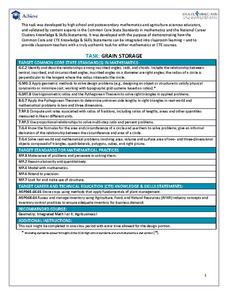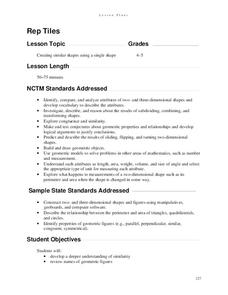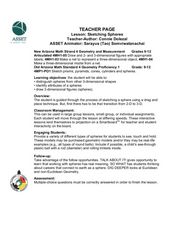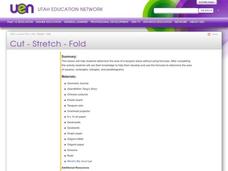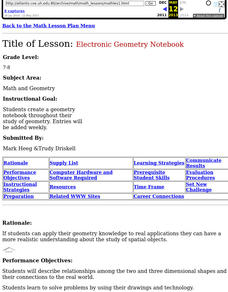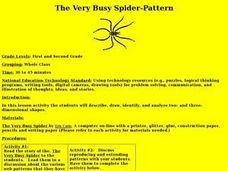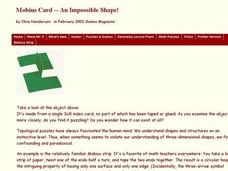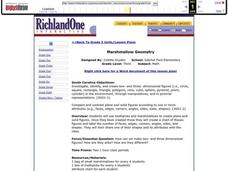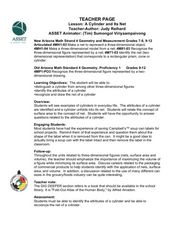Curated OER
Task: Grain Storage
Farming is full of mathematics, and it provides numerous real-world examples for young mathematicians to study. Here, we look at a cylinder-shaped storage silo that has one flat side. Given certain dimensions, students need to determine...
Think Map
Know Your Polygons!
Shape shifters recognize characteristics of polygons. Embracing language arts skills in addition to math, they use a thesaurus to pinpoint specific attributes of a set of polygons. They also participate in a 21-question guessing game...
Curated OER
What's My Rule for Sorting?
Students view objects sorted by one characteristic and name that characteristic. In this sorting rule lesson, students explore to find a new characteristic and write a description of that rule. In early grades the rule might...
Ohio Department of Education
Describing and Creating Plane Figures - Grade One
Young mathematicians draw, create, and describe different shapes using triangles. They discuss attributes of the original and created shapes. Pupils classify the created shapes and draw and write in mathematics journals to communicate...
Improving Measurement and Geometry in Elementary Schools
Rep Tiles
In addition to the catchy title, this lesson plan provides upper graders an opportunity to more closely scrutinize the attributes of plane figures. In particular, they focus on the similarity of different shapes. Both whole-class and...
Cornell University
Constructing and Visualizing Topographic Profiles
Militaries throughout history have used topography information to plan strategies, yet many pupils today don't understand it. Scholars use Legos and a contour gauge to understand how to construct and visualize topographic profiles. This...
Curated OER
Sketching Pyramids
Students sketch and identify properties of pyramids. In this geometry lesson, students create nets to identify three dimensional shapes. They sketch cones, prisms and pyramids.
Curated OER
Create A Map!
Students examine two- and three-dimensional shapes, and discuss map skills and attributes. They plan and create their own school campus maps using pre-cut building site shapes.
Curated OER
Pyramids & Prisms: Guler's Formula
Sixth graders compare and contrast two-dimensional shapes to three-dimensional shapes. After watching a demonstration, they make their own shapes using nets printed on paper. To end the lesson, they use the shapes they made and...
Curated OER
2D Polygons and 3D Nets
Learners compare and contrast two dimensional polygons and three dimentional nets by examining the differences in drawings. They create three dimensional shapes and label the faces, edges, and vertices. After creating the shapes, they...
Curated OER
Sketching Spheres
Students investigate spheres through sketches. In this geometry lesson, students sketch two and three dimensional shapes creating nets. They find and differentiate between the nets for prisms, pyramids, cones, cylinders and spheres.
Curated OER
Sun, Shadows, Surface Structure...and the Face on Mars
Students use light and shadow information to make inferences regarding the three dimensional shapes of specific objects photographed on the surface of Mars. Limitations of the of the data provided are discussed and entries made into the...
Curated OER
Sketching Cylinders
Young scholars create nets of cylinders. In this geometry lesson, students calculate the surface area of cylinders and other solids. They show their understanding of three-dimensional shapes by solving problems.
Curated OER
Area of Tangram Pieces
Mathematicians calculate the area of a tangram piece without using formulas. They use a geometry journal to record activities during this lesson. They make a set of tangrams and use them to compute area. They use...
Curated OER
Electronic Geometry Notebook
Students examine the relationship between two and three dimensional shapes. They use their drawings to solve problems. They create a notebook of the formulas and how they relate to the real world.
Curated OER
The Very Busy Spider-Pattern
Students explore two- and three-dimensional shapes. In this very busy spider instructional activity, students read the story and then create a spider web pattern of their own. The webs must use a symmetrical pattern....
Biology Junction
Biochemistry of Cells
Chemistry and biology work hand in hand, without one you literally wouldn't have the other. Using a presentation, individuals learn about plant cells, animal cells, cell responses, macromolecules, DNA bases, and so much more. A worksheet...
Curated OER
Shapely Figures
Students are given magazines, scissors, glue, and one sheet of construction paper. They look for pictures showing real life representations of rectangular prisms, spheres, cones, and pyramids. Pupils cut out pictures showing each of...
Curated OER
Mobius Card- An Impossible shape
In this algebra worksheet, students solve word problems using linear equations and algebraic symbols. There is one problem with an answer key.
Curated OER
Inuit Sculpture
Kids in grade four through eight research Inuit artists and art styles. After a critical look at Inuit sculpture, they use those forms for inspiration as they create one of their own. They practice using the subtractive method of...
Curated OER
Marshmallow Geometry
Third graders create 2D and 3D shapes using marshmallows and toothpicks. In this geometry lesson plan, 3rd graders create their shapes and document the number of faces, edges, corners, angles, and sides. They share one shape and its...
Curated OER
Squares to Compare
Young scholars investigate how to draw and classify two and three dimensional figures (squares, triangles, rectangles.)
Curated OER
A Cylinder and Its Net
Students sketch the nets for given polygons and cylinders. In this geometry instructional activity, students find the measurements that correspond with prisms, cones and cylinders. they identify parts of three-dimensional shapes.
Curated OER
Pyramids on Parade/Nets
Students sketch the shape of three dimensional pyramids using nets. In this geometry lesson, students differentiate a pyramid from other three dimensional shape. They define the attributes of pyramids.
